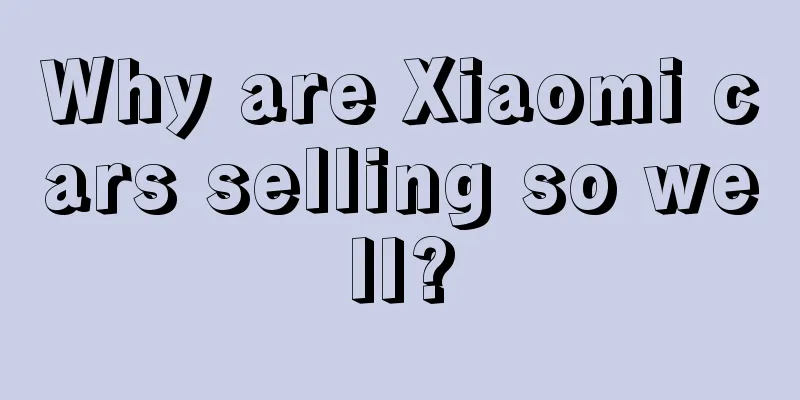There has never been a simple and crude rule in the Internet industry.

01Let’s first look at a hypothesis: You are a technology commentator. You have been closely following the competition and rise and fall of major Silicon Valley companies since the day Apple was founded. You have witnessed how Apple's Apple II and Macintosh won popularity among consumers in the beginning. More importantly, you have also witnessed how Windows, which was open to licensing to multiple hardware manufacturers, defeated the closed Apple with great ease, causing the Mac system, which had good design, experience, taste and reputation, to be completely defeated. As a result, Apple as a company was almost in a desperate situation. By then it was 2010, and the iPhone's iOS had already come to the fore and was gaining popularity, with very good reputation and experience. In addition, iOS, which insists on being closed and not authorizing other manufacturers, has copied the familiar taste of the original macOS. At the same time, it firmly does not support Flash plug-ins, which makes you sigh that the original Steve Jobs is back. At this time, you look at the data and find that Android, an emerging operating system that had only 1.9% market share in 2009, miraculously captured 17.2% of the market in less than a year, surpassing iOS's 14.7% share in one fell swoop. Its growth rate is as fast as a rocket, and its strategy of opening up to major mobile phone manufacturers is exactly the same as that of Windows back then. Smartphone operating system market share in Q2 2010 Everything is so familiar: on one side is a closed system that is self-admiring, and on the other side is an open system that unites the princes of the world. At this point, the question is: How much courage did you have at that time to predict that this closed system would not only not be defeated, but would continue to advance triumphantly and become more courageous, so that it would earn more money than the total profit of all other companies in the industry combined and become a company worth nearly 30,000 US dollars? Yes, at that time, many practitioners in Silicon Valley believed that the closed iOS would eventually be driven out of the market by the open Android. After all, the battle in which Windows defeated Apple was too classic and too beautiful. In history before that time, the only result of operating systems was monopoly. The general view among critics at the time You see, this is what’s interesting about the real business world—there are never any simple and crude rules. Yes, it is generally believed that open operating systems will defeat closed systems, but the prosperity of iOS has taught the industry a lesson; It is generally believed that the market share of companies with cross-side network effects will become stronger as they become stronger, but AutoNavi, a rising star in the taxi market, has taught Didi a lesson; It is generally believed that Internet startups of a certain scale should find a backer between Tencent and Alibaba, but ByteDance has taught the industry a lesson; It is generally believed that it is difficult for Chinese Internet companies to achieve global success with their unique competitiveness, but Tik Tok has taught the industry a lesson; It is generally believed that China cannot produce a true 3A game masterpiece, but Black Myth: Wukong is likely to teach the industry a lesson; In the field of the Internet, there are numerous bugs behind every "general belief". It is these bugs that break cognition that make this industry so eventful and exciting. 02In the Internet field, network effect is a high-frequency term often mentioned in the industry. It can be described by the formula of "Metcalfe's Law" V=K×N² , where V represents the value of a network, N represents the number of nodes in the network, and K represents the value coefficient. A simple statement of this law is: the value of a network is equal to the square of the number of nodes connected to the network. According to this law, in an industry with network effects, once one product gains the upper hand in quantity and scale, it can easily crush another product, thus achieving a near-monopoly. Among the different vertical segments of the Internet, instant messaging is the one that is logically closest to pure network effects. However, whether in the Chinese market or the American market, there has actually been a phenomenon of two or more products coexisting for a long time in the instant messaging industry, and the Matthew effect of the strong getting stronger is not obvious. WeChat has become the king in terms of scale in the Chinese market. According to Tencent’s financial report, WeChat’s combined monthly active users in Q1 2023 reached 1.327 billion, but QQ, which also belongs to Tencent, also had 571 million monthly active users, which has also accumulated impressive active data. At the same time, another fact is that WeChat and QQ have coexisted for more than 12 years. The instant messaging market in the United States is even more fragmented, with the entire market divided up by multiple apps such as WhatsApp, iMessage, Facebook Message, Snapchat, Telegram, etc. The Matthew effect of the strong getting stronger did not appear as predicted by theory. Therefore, any simple and crude single rule to explain a specific industry is actually extremely far from the real business. I once wrote an article in 2020 titled "Why is QQ still the second largest APP in China under the shadow of WeChat?" to explain the complexity. That’s right, simple attribution cannot explain complex reality. 03It is generally believed that building an ecosystem is equivalent to building a moat. In the domestic Internet circle, the obsession with "ecology" has become a popular subject, and the word "ecology" has become the most frequently mentioned high-frequency word among senior executives of large companies. "It is easy to regret products, but difficult to regret the ecosystem" is the dogma believed by many Internet leaders. They believe that once an ecosystem is formed, a deep enough moat will be built. It must be admitted that a healthy ecosystem is indeed more resistant to risks than a single product, but having an ecosystem does not mean that you can sit back and relax. Alibaba was once synonymous with Chinese e-commerce. Jack Ma once said that even with a telescope, he couldn't find any rivals for Alibaba. No one would deny that Alibaba e-commerce has once formed a flourishing e-commerce ecosystem - with a share of more than 80% of e-commerce transaction volume, an excellent product evaluation system, a mature payment and credit guarantee system, a logistics leader that connects data, efficient data and monetization tools, and a huge and diverse group of sellers... To use Alibaba’s words: “This is a business operating system.” “Ali’s mission is to cultivate more JDs.” Jack Ma’s previous bold statement was an expression of his strongest confidence in Alibaba’s e-commerce ecosystem. However, the once flourishing Alibaba ecosystem ultimately failed to withstand the erosion of various unconventional players - Pinduoduo's Kanyida, JD.com's same-day delivery and Douyin, Kuaishou's live broadcast room, WeChat's Moments and mini-programs, and other emerging players have turned Alibaba from a one-man show to a dance of many demons today. The logic of competition has changed - in the new battlefield, scenarios, time, relationships and increments are not on the side of the Alibaba ecosystem. Ecology should not be a goal to be pursued, but rather a natural result. Let’s look at another ecosystem advocate, Xiaomi. From smartphones to smart TVs, from smart speakers to Mi IoT, from Xiaomi Youpin to open platforms, Xiaomi intends to create an ecosystem of technology consumer products. However, when the main channel of smartphones as a whole entered a downturn, Xiaomi could not rely on the ecosystem it had built to obtain additional benefits beyond its performance, whether in terms of revenue or market value. It cannot be said that ecology is not important, but being obsessed with ecology is not safe. After all, the last practitioner who talked about "ecological counter-attack" is still on the other side of the Pacific Ocean and has not returned home. 04There is a popular saying in the Internet circle: "The better a company adapts to the previous era, the more vulnerable it will be in the next era." Indeed, Nokia, the king of the feature phone era, has lost all its market share in the smartphone era; Lenovo and Dell, which were powerful in the PC era, have made no achievements in the mobile era; and Intel, which led the desktop processor market, has only zero market share in the mobile processor market. It seems that every big company has succumbed to the times. Once advanced productivity emerges, it will definitely kill the previous generation of companies. However, this is not the truth of the industry. Using simple "backward productivity" and "advanced productivity" to make a crude binary division of corporate competition does not conform to the reality of modern business. For example, Netscape, which once represented a strong new force in the Internet and was also regarded as advanced productivity, obviously understood the Internet better than Microsoft. However, it was still completely wiped out by the IE browser bundled with Microsoft. When Snapchat was rising, it was generally described by the industry as a powerful advanced productivity in the social field. However, once Facebook copied its Story model, its rise was firmly curbed by the former king. For example, when everyone concludes in hindsight that Nokia, as a behemoth of the previous era, is destined to be unable to easily transform into the next era, the industry often intentionally or unintentionally ignores another feature phone giant of the same era as Nokia - Samsung. You should know that Samsung, like Nokia, was a leader in the era of feature phones. However, it was not defeated by the times. Instead, it made a stunning turn to become the sales champion in the era of smartphones. Yes, the interesting thing about the technology industry is that there is no inevitability. Everything depends on the specific endowments of each company in the industry, the competition, and the speed at which the technology tree expands. Therefore, although I am a new car owner, I do not agree with the fatalism of many people in the industry about the automotive industry. Observing that the new forces in the automotive industry are advancing at an unstoppable pace and most traditional automakers are struggling to cope, it is concluded that no traditional automaker will be able to successfully transform into an intelligent one. In fact, BYD, the current domestic new energy sales champion, is a transformation from a traditional car company. Yes, although most traditional car companies will most likely be ruthlessly crushed by the wheels of history in the wave of electrification and intelligence, I still believe that there will be a very small number of traditional car companies that will be reborn in the fire of the times. There is a lot of gray between chance and necessity. 05The Internet industry naturally respects model innovators. For example, Pinduoduo, which first proposed the "cut one knife" model, successfully counterattacked; Toutiao, which first introduced algorithm recommendation, is invincible in the information industry; Boss Direct Hire, which first launched the "talk directly to the boss" model, has rapidly risen in the fierce recruitment industry; 360 Antivirus, which was the first to adopt the free model, killed all competitors without leaving a single piece of armor. It is generally believed that if a company can create a new model and form a large leading scale, it is very likely to become a disruptor in the industry. However, the interesting thing about the Internet is that there are always exceptions to any general rule. In the short history of mobile Internet, there is a company that even pioneered two new models in the industry but ultimately could not escape the fate of being eliminated by the market. This company is Qutoutiao. Tan Siliang, who came from Shanda, pioneered the "cash subsidies for sinking markets" model in the industry. This direct and powerful new approach once enabled Qutoutiao to obtain collective investment from the three BAT companies and set an unprecedented record of being listed on the Nasdaq in 18 months. Not only that, Qutoutiao's attempt to create a second curve with Midu Novels also pioneered the domestic free novel reading market, triggering a model change in the reading market that had been dull for a long time. It once became a dark horse with extremely fast growth in the industry, making the then market leader China Literature Group sleepless. However, the market's rewards for innovators come and go quickly. Under ByteDance's saturation attack, Qutoutiao's two fronts of developing new models were ruthlessly crushed, and it lost in the ruthless and fierce market competition. The pioneers eventually became martyrs. Yes, after a long period of practice, some domestic early-stage venture capital funds that once highly praised model innovation have now begun to calm down and start paying more attention to the company's long-term value curve and real competitiveness, including underlying technology. 06Genetic theory is widely accepted in the Internet industry. Genetic theory holds that a company usually has its own strengths, which in a sense are the company's genes. A company is more likely to succeed only if it does what its genes excel at. Ignoring its genes and doing things it is not good at will often lead to failure. Indeed, many examples seem to prove the correctness of genetic theory - Google has no social gene, so Google+ failed; Microsoft has no hardware gene, so HoloLens and Surface are not successful; Tencent has social genes but not media genes, so WeChat succeeded while Tencent Weibo failed; Alibaba does not have social genes, so Laiwang failed; ByteDance does not have a community gene, so Toutiao and Wukong Q&A did not succeed... We can cite a lot of examples like this. However, as long as we have a slightly broader vision, we will find that genetic theory is untenable in many cases. Amazon, which started out as an e-commerce company, did not have hardware genes at the beginning, but its Kindle e-book and Echo smart speaker hardware businesses are booming. Amazon, which also did not have a To B gene at the beginning, has made AWS, a cloud service with business logic far different from e-commerce, the industry leader; Does NetEase, which started out as a news company, have gaming and e-commerce genes? Obviously not, but NetEase Games has long occupied the second place in the domestic game market, and NetEase Yanxuan and NetEase Kaola have also found unique ecological niches in the domestic e-commerce market segments. Another typical example is Huawei, which has developed a To C mobile phone business with a completely different strategy and logic from its deep-rooted To B operator business, and has taken a leading position in the To C market. Yes, Tencent, which started out as QQ but didn’t have gaming genes, succeeded in gaming; Sina, which started out as a news company but didn’t have community genes, succeeded in Weibo; Lei Jun, who started out as a PC software company but didn’t have hardware genes, succeeded in Xiaomi; Wang Xing, who worked for Xiaonei, Hainei and Fanfou, has no offline genes, but he also founded Meituan; Zhang Yiming, who worked for Kuxun, Fanfou and Jiujiufang and has no algorithm recommendation genes, has founded ByteDance. Zhang Yiming even admitted that he and his technical team learned the first version of the company's recommendation system from a book. He even joked that the book was published half a year later than planned, which delayed the progress of their company's recommendation system. Therefore, genes may be a factor, or even an important factor, that affects the business development of Internet companies. But there is no doubt that it is by no means a decisive factor, nor even a core factor. The complexity of real Internet business cannot be explained by one or two simple variables. 07Regarding the assertion that “the explanatory power of a single factor is very weak” , a typical question is: why have all foreign Internet giants failed in the Chinese market? Some people say that it is because foreign companies are not used to China's regulations. Yes, Google was unable to enter the market due to this reason. Facebook and Netflix were unable to enter the market due to regulation, and LinkedIn’s withdrawal can also be attributed to this. But the remaining companies are obviously not due to regulation . Is it regulation that caused eBay to lose to Taobao? Is it regulation that caused MSN to lose to QQ? Is it regulation that caused Kindle to fail in mainland China? Is it regulation that caused Uber to fail to compete with Didi? Is it regulation that caused Airbnb to end in disgrace? Obviously not. Some people say that this is because foreign companies are far away, have long decision-making chains, slow actions, and poor localized operations. Yes, these situations may indeed exist, but this conclusion obviously cannot explain why American Internet companies have also achieved success in Europe, Australia, and India. Could it be that in those markets their decision-making chains have instantly become shorter, their actions have become immediately agile, and their localization has flourished? Obviously not. Some people say that it is because of the differences in culture and values between the East and the West. Europe, Australia and the United States have close cultural ties, and the English literacy rate among Indians is also very high. This seems to make sense, but it still cannot explain why many American Internet companies have achieved great success in Japan, which also has an East Asian culture. Some people say that it is because Chinese Internet companies are more hardworking, more inward-looking, and better at using various tricks. The Chinese have crushed foreign companies with their diligence, intelligence, agility, and cunning. Yes, Chinese Internet companies are indeed very competitive, and they are very good at using various "growth hacking" methods. But if our competitiveness is so strong and no one can surpass us, then why is it that after so many years since Baidu entered Japan in 2008, only Tik Tok and Shein have been relatively successful in the Internet overseas expansion? Therefore, any attempt to use a single factor to generally explain and summarize a series of phenomena is unlikely to succeed. Are all of the above reasons unreasonable? Of course not. The reasons for this problem are complex. In my opinion, in addition to the above reasons, there is another one that has a certain explanatory power, which is - Like the United States, China is one of the only two single, large-scale unified markets in the world. Such a market naturally makes it easier for domestic Internet companies that understand local users better to obtain network effects, scale effects and first-mover advantages. So is this explanation correct and perfect? No, because if this were the only reason, then it would be realistic to conclude that all Chinese companies that come to the United States would be defeated by its own domestic companies. But it is clear that the success of Tik Tok and Shein makes this explanation not entirely tenable. Therefore, regarding the issue of "all foreign Internet companies have failed in China", the reasons behind each of their failures are diverse, complex, and specific. Any general explanation using a single factor is actually lazy thinking and rogue judgment. ConclusionI used to study economics, but when I look back at the century-long history of economics, I find that Although the Internet has overturned many economic assumptions, for example, economics is a discipline that studies scarcity, the supply of Internet information is not scarce at all. However, after the birth of the Internet, economics did not develop and produce some classic theories that could be included in economics textbooks and that the general public would be familiar with. I believe that the reason behind this is that it is difficult to accurately attribute anything to the Internet, a young and rapidly expanding industry. Any general summary is likely to lead to many exceptions, thus increasing the possibility of economists' theoretical abstraction. This is actually the most fascinating thing about the Internet. Author: Wei Xi, Source: Official Account: "Wei Xi Zhibei" |
<<: Tea e-commerce private domain full case
>>: A complete case study to understand how to create user portraits
Recommend
Roasted cactus, roasted watermelon...all kinds of weird barbecues are popping up, and netizens are calling for help!
The "weird trend" in Chengdu's barbe...
If you log out of Facebook, can others still find you? Is the content still there?
In the age of social media, Facebook is one of the...
Successful transformation! Domestic trade OEM has become the leader of Shopee
China's domestic trade market is full of volat...
Alipay is cracking down on illegal rentals. What are the tricks in rental mini-programs?
Recently, Alipay has rectified illegal rental mini...
Employees who left big companies are flooding Xiaohongshu, creating a new money-making track
Many bloggers who have resigned from their jobs ha...
With over 5 million cups sold, why is Nayuki Super Bucket so popular?
The popularity of the super-large fruit bucket has...
Xianyu "gives up" on Taobao
In the field of e-commerce, the positioning and st...
"Killing" Tiffany and catching up with Apple, why is Xiaomi Home so competitive?
Recently, #小米网街# has become very popular. Xiaomi H...
Do I need to go to a bank to activate a digital credit card? Is it worth getting a digital credit card?
With the rapid development of technology, digital ...
When products are increasingly raising the payment scythe, where will the user experience go?
The Internet industry has always been free, but wi...
How do Chinese people register on etsy? What information do I need?
Etsy has opened entry channels to 45 countries, al...
Data analysis report, how to write the [Suggestions] section?
How to make effective strategic suggestions in dat...
How to open a store on the Wish platform? What preparations should be made before opening a store?
As a world-renowned e-commerce platform, Wish prov...
How long does it take for Amazon to deliver to Xinjiang? How is Amazon's delivery fee calculated?
As one of the world's largest e-commerce platf...
How to view Amazon store traffic? How to increase organic traffic?
After opening a store on Amazon, merchants must le...









